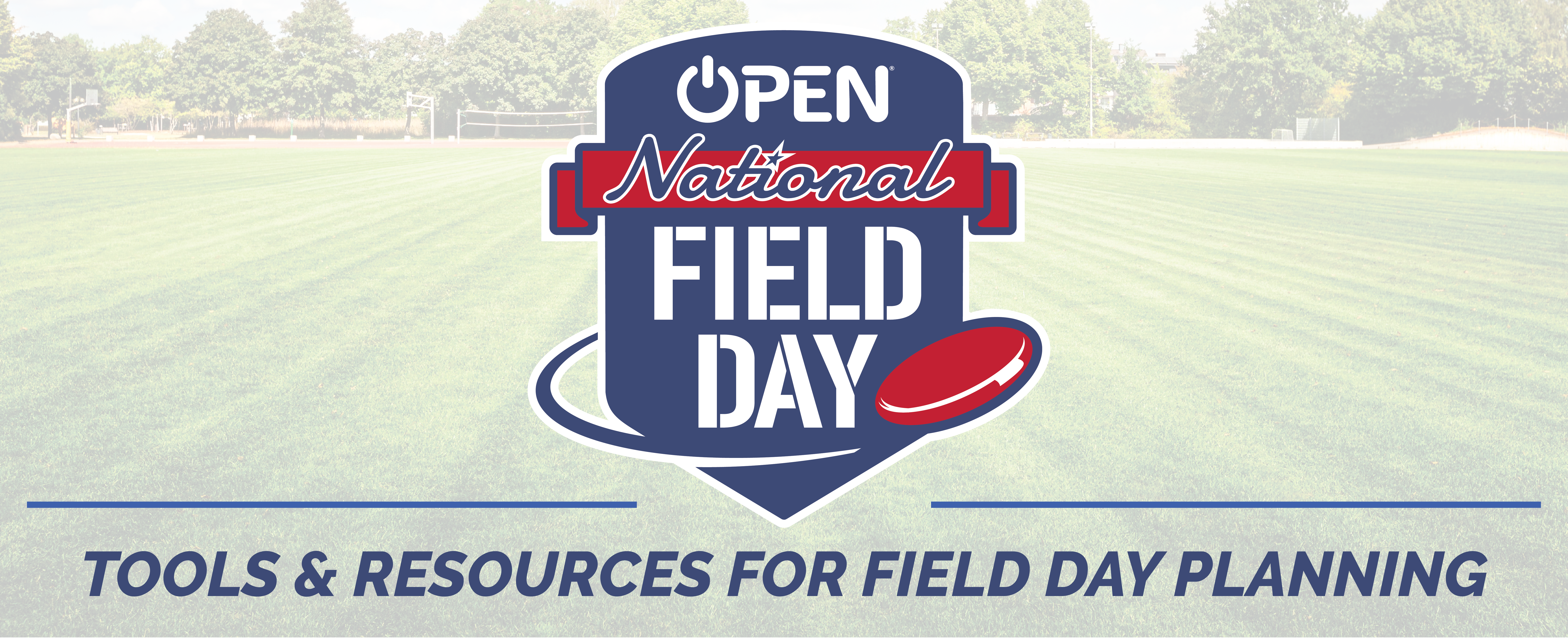In celebration of the Summer Olympic Games, we created 10 stations you can use for an Olympic themed Field Day. Each station highlights a sport included in the Summer Olympic Games and includes an activity plan and a station card. In addition, we included a passport that you can use to help classes rotate through the stations with some fun facts about each sport and country that is included for that station.
OPEN National Field Day was created in response to the 2020 COVID-19 Pandemic when students were learning virtually, and traditional field day seemed impossible. OPEN, US Games, and a host of partners sprang into action and created a field day experience for millions of students. In honor of that 2020 collaborative effort, OPEN National Field Day continues.
We revised our set of traditional field day activities for you to use with your students. These activities were created by the OPEN members and contributors listed in the Field Day Overview. You’ll also find the collection of field day events that were created and revised between 2020 and 2021. Partner logos are displayed to recognized and thank the many organizations who joined our efforts during the COVID-19 Pandemic. Please enjoy all the resources provided. Happy Field Day Season!

Summer Olympic Games Activity Plans:
- Summer Olympic Games Activity Packet: [PDF]
- Torch Race Tic-Tac-Toe: [PDF, WORD]
- Olympic Rings Relay: [PDF, WORD]
- Lacrosse: Clean Your Yard: [PDF, WORD]
- Basketball: Dribble Stoppers: [PDF, WORD]
- Volleyball: Volley Battleship: [PDF, WORD]
- Gymnastics: Balance Tag: [PDF, WORD]
- Softball: Race Base Softball: [PDF, WORD]
- Handball: Switch: [PDF, WORD]
- Track & Field: Javelin Relay: [PDF, WORD]
- Football: Football Freeze Tag: [PDF, WORD]

Summer Olympic Games Station Resources:
- Station Passport: [PDF, WORD]
- Torch Race Tic-Tac-Toe Station Card: [PDF, WORD]
- Olympic Rings Relay Station Card: [PDF, WORD]
- Lacrosse Station Card: [PDF, WORD]
- Basketball Station Card: [PDF, WORD]
- Volleyball Station Card: [PDF, WORD]
- Gymnastics Station Card: [PDF, WORD]
- Softball Station Card: [PDF, WORD]
- Handball Station Card: [PDF, WORD]
- Track & Field Station Card: [PDF, WORD]
- Football Station Card: [PDF, WORD]
Universal Design Events (powered by Boardmaker)
Universal Design Events (powered by Boardmaker)
Lil Sugar Mission Powered by Hip Hop Public Health
- COMPLETE CARD SET [Google, PDF, PPT]
- SPANISH CARD SET [Google, PDF]
- Mission 1: Disguise Relay [PDF, YouTube]
- Mission 2: Plank Hacker [PDF, YouTube]
- Plank Hacker Stations [Google, PDF]
- Spanish Plank Stations [Google, PDF]
- Mission 3: Energy Balance Clues [PDF, YouTube]
- Mission 4: Lil Sugar Dance [PDF, YouTube]
- Mission 5: FULL DANCE ALONG [YouTube]
- Lil Sugar Downloadable Audio Track [SOON]
- Hip Hop Public Health [LINK]
Look for the Good Charging Stations
- COMPLETE CARD SET [Google, PDF, PPT]
- SPANISH CARD SET [Google, PDF]
- UDL CARD SET [Google, PDF, PPT]
- UDL SPANISH SET [Google, PDF]
- Embarrassed Wiggle Jar [PDF, YouTube]
- Excited Wiggle Jar [PDF, YouTube]
- Frustrated Wiggle Jar [PDF, YouTube]
- Worried Wiggle Jar [PDF, YouTube]
- Kinzoo [Learn About Kinzoo]
- Get the Kinzoo App [LINK TO KINZOO]
Team Relay Races from Rising New York Road Runners
Priority Outcomes Focus for Field Day
VALUES PHYSICAL ACTIVITY
Students recognize the value of physical activity for physical, emotional, and mental health.
- Personal Enjoyment (1) Describes positive feelings that result from physical activity participation. (3) Reflects on the reasons for enjoying selected physical activities.
- Social Interaction (K) Discusses the enjoyment of playing with family and friends. (1) Discusses the reasons for participating in physical activity with friends. (2) Discusses ways to encourage others to be physically activity with friends. (3) Describes the positive social interactions that come when engaged with others in physical activity. (4) Describes and compares positive social interactions when engaged in partner, small-group, and large-group physical activities. (5) Describes the social benefits gained from participating in physical activity. (6) Demonstrates respect for self and others in activities and games by following the rules, encouraging others, and playing within the spirit of the game or activity. (7) Demonstrates the importance of social interaction by helping and encouraging others, avoiding trash talk, and providing support to classmates. (8) Demonstrates respect for self by asking for help and helping others in various physical activities.
DEMONSTRATES RESPONSIBLE BEHAVIORS
Students demonstrate responsible personal and social behavior.
- Working with Others (K) Shares equipment and space with others. (1) Works independently with others in a variety of class environments. (2) Accepts responsibility for class protocols with personal and cooperative behavior as well as performance actions. (3) Works cooperatively with others. (4) Accepts “players” of all skill levels into the physical activity. (5) Accepts, recognizes, and actively involves others with both higher and lower skill abilities into physical activities and group projects. (6) Accepts differences among classmates in physical development, maturation, and varying skill levels by providing encouragement and positive feedback. (7) Demonstrates cooperation skills by establishing rules and guidelines for resolving conflicts. (8) Responds appropriately to participants’ ethical and unethical behavior during physical activity by using rules and guidelines for resolving conflicts.
- Etiquette (K) Recognizes the established protocol for class activities. (1) Exhibits the established protocols for class activities without reminders. (2) Recognizes the role of rules and etiquette in teacher-designed physical activities. (3) Recognizes the role of rules and etiquette in physical activity with peers. (4) Exhibits etiquette and adherence to rules in a variety of physical activities. (5) Critiques the etiquette involved in rules of various game activities. (6) Identifies the rules and etiquette for physical activities/games and dance activities.


















